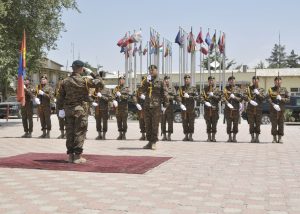The North Atlantic Treaty Organization (NATO) recently celebrated its 75th anniversary in Washington, D.C. Since its establishment in 1949, partnership with NATO has become an important foreign policy tool not only for member countries but also for non-member states like Mongolia. With NATO eying partners in Asia, Mongolia-NATO relations will continue to emphasize capacity-building mechanisms to address Mongolia’s nontraditional security issues, such as cybersecurity.
As Foreign Minister of Mongolia Battsetseg Batmunkh highlighted in a 2021 interview, “Mongolia’s special partnership and cooperation with NATO aims at participating in political dialogue, education, capacity-building, peacekeeping operations, and overcoming new security challenges.” Battsetseg also emphasized that, per Mongolia’s multi-pillared foreign policy concept, the Mongolia-NATO partnership is not aimed against any other country.
Since 2005, Mongolia and NATO have been in dialogue and cooperated on multiple continents. The two decades of Mongolia-NATO partnership illustrates the significance of military diplomacy.
To Ulaanbaatar, the early 2000s were crucial years as Mongolia’s foreign policy strived to establish and strengthen relationships with global institutions, which included NATO. In accordance with Mongolia’s foreign policy concept, partnership with NATO only came at the level of cooperation – without having Mongolia join as a member state.
Under Mongolia’s multi-pillared foreign policy strategy, Ulaanbaatar implemented military diplomacy with NATO, especially in education, peacekeeping, and capacity-building. This partnership helped the Mongolian military to modernize and keep pace with global developments.
Mongolia has actively participated in a number of NATO-led operations and missions in the Balkans and the Middle East. Between 2005 and 2007, around 70 Mongolian military personnel participated in the Kosovo Force Intervention (KFOR) peace-support operation. At the time, Mongolia was part of the French contingent’s multinational forces. Mongolia’s diplomatic relations with NATO member states and its engagement with multinational forces have boosted Ulaanbaatar’s international reputation.
In 2014, Mongolia partnered with NATO’s Partnership Interoperability Initiative, which aims to enhance the interoperability of the Mongolian Armed Forces through an exchange of best practices. NATO-led programs often involve courses and training for military professionals, which plays an important role in modernizing Mongolia’s armed forces.
Additionally, Mongolia is part of the Building Integrity Program, which promotes good governance, reduces corruption, and increases accountability in the defense sector.
Amid successive global crises on different continents, Mongolia’s foreign policy looked to strengthen its contribution to the global peacekeeping effort. During the lengthy war in Afghanistan, Mongolia was a major contributor to both the United Nations and NATO missions in Afghanistan. As of February 2021 – the last deployment before the end of the mission – Mongolia still contributed 233 military personnel to the Resolute Support Mission, marking one of the largest partner contributors.
In his book “Mongolia and the United States: A Diplomatic History,” former U.S. Ambassador to Mongolia Jonathan S. Addleton called Mongolia’s Afghanistan deployment “proportionally one of the most significant contributions made by any country to the Afghan campaign.”
In recent years, Mongolia-NATO relations have expanded into tackling modern security issues such as cybersecurity. As Mongolia’s “Digital Nation” becomes a reality, the cybersecurity sector has become an area of vulnerability, and it needs improvement. Foreign partnerships and training programs not only help improve the country’s cybersecurity systems but also augment the Mongolian Armed Forces’ capabilities in cyber incident response.
Between 2017 and 2020, NATO programs trained the Mongolian Armed Forces on cyber defense capabilities. In January 2021, Mongolia-NATO cooperation on cybersecurity culminated in the opening of a new Cyber Security Center for the Mongolian Armed Forces. NATO’s Deputy Secretary General Mircea Geoana attended the virtual opening ceremony along with the Mongolian minister of defense.
Mongolia also completed a multi-year program through the Defense Education Enhancement Program, known as DEEP. According to the official press release from NATO, the president of the Mongolian National Defense University, Major General Yadmaa Choijamts, stated, through DEEP “45 military personnel from the Mongolian Armed Forces, the General Authority for Border Protection and National Emergency Management Agency have participated in the Mongolian Staff Officer Course and gained knowledge and skills to carry out their duties in international peacekeeping operations staff.”
Mongolia-NATO bilateral relations have changed in the last 19 years but so has the geopolitical atmosphere. With advancements in information technology, developing countries need greater assistance in training, strengthening, and protecting their digital systems from cyber crimes.
Mongolia’s military diplomacy places an emphasis on strengthening capacity-building partnerships. Ulaanbaatar’s relations with NATO will continue to strengthen Mongolia’s capabilities to solve emerging security challenges.

































